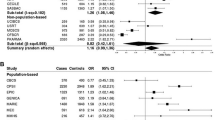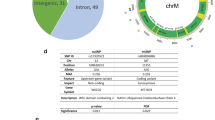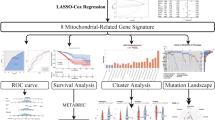Abstract
Interactions between mitochondrial deoxyribonucleic acid (mtDNA) variants and the risk of developing breast cancer were investigated using DNA samples collected from non-Jewish European American breast cancer patients and ethnically age-matched female controls. Logistic regression was used to evaluate two-way interactions between 17 mtDNA variants. To control for multiple testing, empirical P values were calculated using permutation. Odds ratios (ORs) and corresponding 95% confidence intervals (CIs) were calculated to measure the contribution of variants in modifying the risk of developing breast cancer. A highly significant interaction was identified between variants 12308G and 10398G (empirical P value = 0.0028), with results suggesting these variants increase the risk of a woman developing breast cancer (OR = 3.03; 95% CI 1.53–6.11). Nominal significant P values were also observed for interactions between mtDNA variants 709A and 16189C; 4216C and 10398G; 4216C and 16189C; 10398G and 16159C; 13368A and 16189C; and 14766T and 16519C. However, after adjusting for multiple testing, the P values did not remain significant. Although it is important to elucidate the main effect of mtDNA variants on the risk of developing breast cancer, understanding gene × gene interactions will give a greater knowledge of disease etiology and aid in interpreting a woman’s risk of developing breast cancer.
Similar content being viewed by others
Log in or create a free account to read this content
Gain free access to this article, as well as selected content from this journal and more on nature.com
or
References
Antoniou AC, Easton DF (2006) Models of genetic susceptibility to breast cancer. Oncogene 25:5898–5905
Bai RK, Leal SM, Covarrubias D, Liu A, Wong LJ (2007) Mitochondrial genetic background modifies breast cancer risk. Cancer Res 67:4687–4694
Canter JA, Kallianpur AR, Parl FF, Millikan RC (2005) Mitochondrial DNA G10398A polymorphism and invasive breast cancer in African-American women. Cancer Res 65:8028–8033
Carrieri G, Bonafe M, De Luca M, Rose G, Varcasia O, Bruni A, Maletta R, Nacmias B, Sorbi S, Corsonello F, Feraco E, Andreev KF, Yashin AI, Franceschi C, De Benedictis G (2001) Mitochondrial DNA haplogroups and APOE4 allele are non-independent variables in sporadic Alzheimer’s disease. Hum Genet 108:194–198
Darvishi K, Sharma S, Bhat AK, Rai E, Bamezai RN (2007) Mitochondrial DNA G10398A polymorphism imparts maternal Haplogroup N a risk for breast and esophageal cancer. Cancer Lett 249:249–255
Filosto M, Tomelleri G, Tonin P, Scarpelli M, Vattemi G, Rizzuto N, Padovani A, Simonati A (2007) Neuropathology of mitochondrial diseases. Biosci Rep 27:23–30
Finsterer J (2007) Genetic, pathogenetic, and phenotypic implications of the mitochondrial A3243G tRNALeu(UUR) mutation. Acta Neurol Scand 116:1–14
Forli F, Passetti S, Mancuso M, Seccia V, Siciliano G, Nesti C, Berrettini S (2007) Mitochondrial syndromic sensorineural hearing loss. Biosci Rep 27:113–123
Kokotas H, Petersen MB, Willems PJ (2007) Mitochondrial deafness. Clin Genet 71:379–391
Levy-Lahad E, Friedman E (2007) Cancer risks among BRCA1 and BRCA2 mutation carriers. Br J Cancer 96:11–15
Mims MP, Hayes TG, Zheng S, Leal SM, Frolov A, Ittmann MM, Wheeler TM, Prchal JT (2006) Mitochondrial DNA G10398A polymorphism and invasive breast cancer in African-American women. Cancer Res 66:1880; author reply 1880–1881
Mortiboys HJ, Schaefer J, Reichmann H, Jackson S (2007) Mitochondrial dysfunction in Parkinson’s disease–revisited. Neurol Neurochir Pol 41:150–159
Mosquera-Miguel A, Alvarez-Iglesias V, Carracedo A, Salas A, Vega A, Milne R, de Leon AC, Benitez J (2008) Is mitochondrial DNA variation associated with sporadic breast cancer risk? Cancer Res 68:623–625 author reply 624
Onyango IG (2008) Mitochondrial dysfunction and oxidative stress in Parkinson’s disease. Neurochem Res 33:589–597
Petros JA, Baumann AK, Ruiz-Pesini E, Amin MB, Sun CQ, Hall J, Lim S, Issa MM, Flanders WD, Hosseini SH, Marshall FF, Wallace DC (2005) mtDNA mutations increase tumorigenicity in prostate cancer. Proc Natl Acad Sci USA 102:719–724
Setiawan VW, Chu LH, John EM, Ding YC, Ingles SA, Bernstein L, Press MF, Ursin G, Haiman CA, Neuhausen SL (2008) Mitochondrial DNA G10398A variant is not associated with breast cancer in African-American women. Cancer Genet Cytogenet 181:16–19
Torroni A, Huoponen K, Francalacci P, Petrozzi M, Morelli L, Scozzari R, Obinu D, Savontaus ML, Wallace DC (1996) Classification of European mtDNAs from an analysis of three European populations. Genetics 144:1835–1850
Verma M, Naviaux RK, Tanaka M, Kumar D, Franceschi C, Singh KK (2007) Meeting report: mitochondrial DNA and cancer epidemiology. Cancer Res 67:437–439
Wong LJ (2007) Pathogenic mitochondrial DNA mutations in protein-coding genes. Muscle Nerve 36:279–293
Yen MY, Wang AG, Wei YH (2006) Leber’s hereditary optic neuropathy: a multifactorial disease. Prog Retin Eye Res 25:381–396
Acknowledgments
This study was supported in part by NIH grant CA10023 and Department of Defense US Army Breast Cancer Research Program, DAMD17-01-1-0258.
Author information
Authors and Affiliations
Corresponding author
Additional information
D. Covarrubias and R.-K. Bai contributed equally to this article.
Rights and permissions
About this article
Cite this article
Covarrubias, D., Bai, RK., Wong, LJ.C. et al. Mitochondrial DNA variant interactions modify breast cancer risk. J Hum Genet 53, 924–928 (2008). https://doi.org/10.1007/s10038-008-0331-x
Received:
Accepted:
Published:
Issue date:
DOI: https://doi.org/10.1007/s10038-008-0331-x
Keywords
This article is cited by
-
Modeling of mitochondrial genetic polymorphisms reveals induction of heteroplasmy by pleiotropic disease locus 10398A>G
Scientific Reports (2023)
-
Selected mitochondrial DNA landscapes activate the SIRT3 axis of the UPRmt to promote metastasis
Oncogene (2017)
-
The saga of the many studies wrongly associating mitochondrial DNA with breast cancer
BMC Cancer (2014)
-
mtDNA germ line variation mediated ROS generates retrograde signaling and induces pro-cancerous metabolic features
Scientific Reports (2014)
-
Bayesian Network and Mechanistic Hierarchical Structure Modeling of Increased likelihood of Developing Intractable Childhood Epilepsy from the Combined Effect of mtDNA Variants, Oxidative Damage, and Copy Number
Journal of Molecular Neuroscience (2014)



